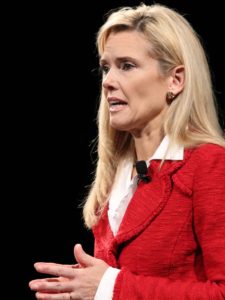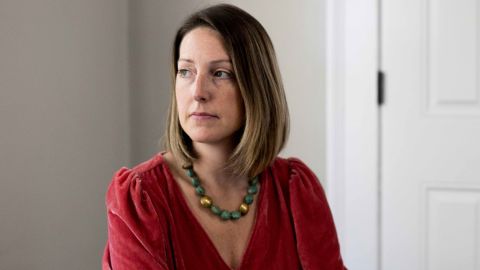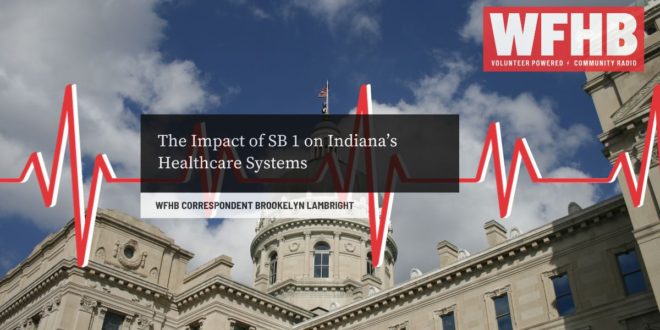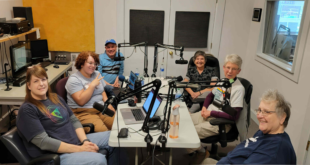Indiana State Senator Shelli Yoder was approached by a woman and her husband while out at dinner. The couple had recently lost their baby to stillbirth. The woman never thought about the conversations in Indianapolis regarding a statewide abortion ban until then. But when she needed care quickly, she realized that Indiana’s abortion ban impacted the quality-of-care mothers like herself receive.
14 states have placed full bans on abortion since the overturn of Roe v. Wade by the U.S. Supreme Court on June 24, 2022. The state of Indiana’s abortion ban or SB 1 recently took effect on August 21, 2023. At the frontline of the conversation are women seeking access to abortion care. But SB 1 isn’t just impacting women’s access to abortions, it’s also impacting the state’s ability to provide quality maternal and infant healthcare.
“Indiana is already failing to protect the lives of Hoosier women and girls. We have the third highest maternal mortality rate in the nation,” Yoder said.

Contributing to the high maternal mortality rate in Indiana is the lack of OBGYNs and maternal healthcare doctors willing to work in the state. Yoder says states that have enacted abortion bans have seen a 10.5% drop in applicants for obstetrics and gynecology in 2023.
The American College of Obstetricians and Gynecologists legislative co-chair Dr. Caitlin Bernard says Indiana is struggling to recruit physicians who are willing to practice in a state with an abortion ban in place.
“Many physicians are very concerned about the quality of care they can provide when there is an abortion ban in effect,” she said. “That doesn’t just include abortion care but also includes things that are related to that. Including pregnancy care, pregnancy-related complications, high-risk pregnancies, and maternal and fetal health conditions.”
Physicians who violate SB 1 face a Level 5 felony which could result in the removal of their license and jail time. But what qualifies as a violation of SB 1 isn’t exactly clear. Bernard says it is up to doctors to discern whether their patient fits within the exceptions of SB 1.
“Essentially, you have to try and figure out if the patient that you have fits into one of the exceptions in the law. Do they have a life-threatening condition? Do they have a lethal fetal anomaly? Have they been a survivor of rape and is this pregnancy a result of it? Sometimes it is straightforward, but oftentimes this is challenging,” Bernard said.

SB 1 says physicians must decide whether their patient fits into an exception listed using their “best medical judgment.” Other individuals can disagree with a doctor’s best judgment however. The law’s nuance in a doctor’s ability to perform life-saving healthcare is ultimately scaring doctors away from states with abortion bans in place.
Ultimately, a lack of physicians leads to the closing of hospitals and maternity care centers, especially in rural counties across the state. Bernard says the closure of hospitals largely impacts women in labor and in need of emergency maternal healthcare. It’s difficult for women in areas with no local hospitals to receive adequate healthcare which may result in long-term health risks for the mother and baby.
“You have people at high risk for high blood pressure, preeclampsia, preterm labor, and high risk for hemorrhaging during labor and delivery,” she said. “They can’t necessarily predict when they will go into labor. So when you are delivering at home or in an ER instead of an adequately staffed, experienced maternity care center, you’re going to have a higher risk for complications that aren’t managed appropriately which end up causing long-term consequences for you and your baby.”
Bernard also said that access to prenatal care may be compromised in areas that lack maternal healthcare. Prenatal care ensures that doctors identify early complications in a pregnancy that can be treated and managed. Worse outcomes for the baby and mother result from a lack of prenatal care.
“People think, ‘Just drive to Indianapolis,’ but for a lot of people that is just not feasible. They don’t have transportation, they don’t have time off of work, childcare, gas money, etc. So this is going to be hardest for communities of color, of poverty, of disability. So you’re going to see a proportional worsening of health in those populations,” Bernard said.
In Monroe County, residents have access to All-Options, a pregnancy resource center. All-Options advises women on their abortion options and provides funding for local families in the form of the Hoosier Diaper Program. The State Program Director for All-Options Jess Marchbank says calls to their center are the lowest they have ever been.
“The number of calls to our abortion fund has plummeted since August 1 [2023]. In July we received almost 400 calls. The number of calls that came into our system in August was about half of July. September has been even less. In September we received only 123 phone calls. I have not seen a number that low since our abortion fund opened in 2015,” Marchbank said.
Marchbank attributes the low number of calls to the uncertainty surrounding the legal status of abortion in Indiana. While abortion in Indiana is not accessible, Marchbank says All-Options helps women find abortion access in neighboring states.

Along with supporting women in need of abortion care, All-Options provides essential parenting supplies such as diapers, diaper cream, and wipes. In Monroe County, All-Options supports 200 families a month, distributing nearly 20,000 diapers each month.
A lawsuit filed by the ACLU on behalf of Hoosier Jews for Choice and five anonymous women against SB 1 is still pending. Their lawsuit claims SB 1 violates Indiana’s Religious Freedom Restoration Act. It is unclear when Indiana’s Supreme Court will hold hearings in regard to the lawsuit.
SB 1 remains in effect in Indiana for now. Marchbank encourages any women looking for advice or support to reach out to All-Options or call/text their Hoosier Abortion Fund hotline. Only time will tell how Indiana’s abortion ban will continue to impact maternal healthcare across the state.
 WFHB Bloomington Community Radio
WFHB Bloomington Community Radio

